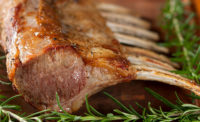Growing organically
Five generations of the Harris family have raised cattle on the family farm in Bluffton, Ga., a town of about 100 people in southwest Georgia. Starting with James Harris in the 1860s, White Oak Pastures would raise grass-fed cattle, butcher it and sell it locally. After World War II, the Harrises began utilizing large Midwest feedlots and selling their cattle west to be a part of the grain-fed beef industry. White Oak Pastures has, since the 1990s, gone back to raising its cattle in the traditional organic, grass-fed manner, and it has tapped into a growing movement in the process.
The company raises about 650 breeding cows, along with their calves, on more than 1,000 acres of land. Will Harris III, the company’s current president and fourth generation farmer, said that the switch back to grass-fed cattle began in the mid-1990s.
“It started around 1995 where there was a growing interest in naturally produced beef,” he says. “I think it was probably the next step of the organic vegetable production movement. The same people who had been clamoring for vegetables since the ’70s embraced meat that was produced more naturally.
“I really preferred owning my own cattle all the way through the system,” he says. The company has been distributing its products to retailers and distributors since the early 2000s, starting with Tree of Life and adding retailers such as Publix and Whole Foods. At first, it was sending its cattle to a local locker located about nine miles away in Blakely. That plant went out of business around 2004, and the next-closest plant was located 100 miles away in Tifton.
“They had a business of their own and couldn’t devote but a small amount of their processing capacity to us,” Harris explains. “It wasn’t enough to handle the number of cattle we were raising.”
Faced with either stalling business growth or building a processing plant, Harris made the step into meat processing with the construction of a 5,300-square-foot plant.
The reluctant processor
“I never wanted to be in the processing business,” Harris says from his office in the new building, which was officially opened last spring. However, when it came time to build a plant, he built the most state-of-the-art facility possible, with a capacity to kill and process 15 head a day, enough equipment to make and package a variety of products, and a zero carbon footprint.While White Oak Pastures’ specialty and main product is fresh beef cuts, it also has a grinder for ground beef, a bowl chopper for hot dogs and a smoker for sausages. Everything that leaves the plant is vacuum-sealed before being shipped.
Harris says that to prepare himself for the plant, he did considerable research online, as well as talking with others in the industry.
“At the time, I was almost 50 years old, so I was climbing a very steep learning curve on a topic I didn’t have a passion for learning, but it had to be done,” he recalls. He credits the Georgia Department of Agriculture with helping him through the steps of getting the plant built and certified by the USDA.
Finding a plant manager to help with the day-to-day management of the facility proved to be a challenge. Initially, Harris had found a meat-industry veteran to act as manager, but the man realized halfway through the construction that the job was beyond his capabilities.
“I was scared to death,” Harris says. “I was halfway through a building that I knew I didn’t know how to run and didn’t have anybody to run it.” As a graduate of the University of Georgia animal science program, Harris was on good terms with the dean of the school and called to ask about any graduates who could take on the responsibilities. The deal referred him to Brian Sapp, who was about to graduate from the University of Florida with a master’s degree in meat science.
“God sent him to me,” Harris says, admitting he is willing to overlook that Sapp is a Florida Gator.
Harris was warned by many others in the industry about the problems of finding employees to run the equipment and do the work, but he wasn’t concerned about it, with good reason.
“We are in rural south Georgia,” he explains. “It’s a very economically impoverished area, and we’ve got a lot of people who want to live here, because it’s home to them and there’s a good quality of life here. But there aren’t a lot of jobs for them.”
White Oak Pastures employs 20 people, many of whom split time working on the farm and working in the plant. Harris adds that high turnover ratios aren’t an issue at the company.
“What I’ve got is good, local people for whom this is a career, not a transient situation,” he explains. “I like them, and I believe they like me — some days more than others — and I believe they like their job. Nobody here makes minimum wage."
Consumer expectations
Harris is a proponent of local food systems, and his preference would be to sell his product strictly within a 200-mile radius of Bluffton. However, economic demands have necessitated distribution of the company’s beef up and down the Eastern seaboard, from Miami to Princeton, N.J.“While I still think that my beef in Princeton and Miami is a lot more local than beef that’s shipped from Midwestern packing plants, it’s not as local as I wish it was,” he comments, noting that locally raised tomatoes is quite different from locally raised beef. Harris stresses that he is not a critic of industrial-produced beef.
“It’s fine product,” he says. “The folks that shop at large discount grocery stores and eat at fast-food restaurants want food that is cheap, safe, consistent and convenient. But there are sophisticated consumers that want beef that’s raised differently and in more specific ways, and that’s the market I serve.”
All of White Oak Pastures’ employees understand the consumers as well, and anyone can go to Sapp or Harris with any problems or concerns, as far as quality.
“The people that buy our beef aren’t buying it at a fast-food restaurant or discount chain store,” Harris says. “They want and expect quality, and if we fail to deliver that, we’re out of business. We can’t ship something that’s just all right, and everybody here knows and understands that.”
Harris knows that his clientele want more than just a product that is organic and grass-fed. They want the company itself to hold to the same principles that they themselves believe. White Oak Pastures is certified humane, and it uses holding pens designed by Dr. Temple Grandin’s consulting firm. The plant is also a zero-waste facility. While these attributes are important to White Oak Pastures’ consumers, they are also important to Harris.
“My hero is George Washington Carver. He said, ‘In nature there is no waste,’” he points out. “If we’d been living by that since the end of World War II, we wouldn’t have global warming, pollution, landfills and diminished resources.”
The facility cost $2.2 million to build, but it has many sustainable features. Solar panels allow the company to heat its groundwater from 69 degrees to 180 degrees without consuming any electricity.
“All of my washout water goes into a system of six 5,000-gallon underground tanks hooked up in a series,” Harris adds. “When the water comes out of number six, it’s potable water, and it’s circulated onto my pasture through a New Zealand pod-type irrigation system.”
The waste and eviscerate is ground up and put into a digester, which liquefies the waste and converts it into fertilizer for the fields. The bones that aren’t sold are dried, ground up and used as bone meal. The hides are sold for leather, so practically nothing from the animal is wasted.
The plant is large enough that it can accommodate growth in business, both in the company’s fresh-meat business but also in its ready-to-eat business. A grass-fed hot dog has been in development for some time, and the company hopes to get that to the market soon. The building is configured to be expandable, should it be needed, but Harris says he would he be content to keep it at the size it currently is. The family’s past has been in farming, and White Oak Pastures is to remain a producer first, processor second.
“What I’m doing here is exactly what my great-granddaddy and my granddaddy did. They butchered cows on this farm and sold beef locally. All we’re doing is returning to that,” he says. “I don’t consider this packing plant to be a separate industry that I’ve gotten into. I consider it to be a value-added extension of the farm.”
Looking for a reprint of this article?
From high-res PDFs to custom plaques, order your copy today!





